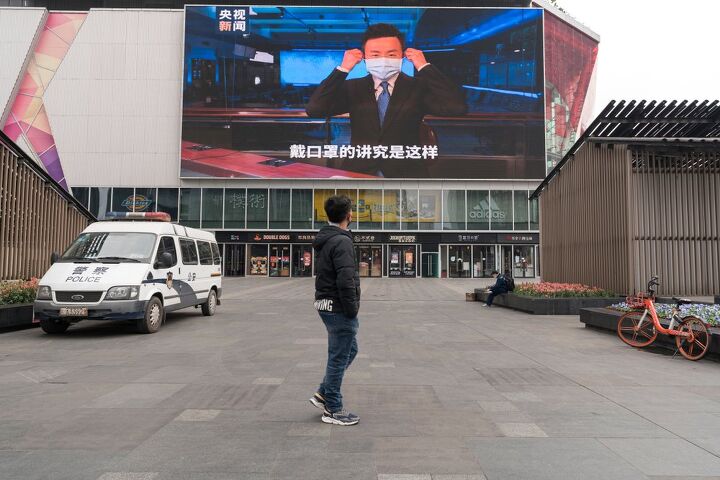Dark, Contagious Clouds Gather Over the Auto Industry

With South Korea, Italy and Iran now reporting growing coronavirus outbreaks, it looks like this is going to be one of these long-haul illnesses that sends everyone to the store to stock on up on milk and bread. As you might have guessed, automakers have continued issuing warnings as the virus’ range continues to expand. On Wednesday, Toyota announced that its Japanese plans will undoubtedly be impacted by parts shortages over the next few weeks as Chinese suppliers remain dormant.
The worst of the outbreak is still located in Wuhan, where the virus is spreading out toward China’s coastal cities. Reliable figures for the number of people affected are difficult to come by. The Communist Party of China (CPC) and World Health Organization (WPO) both claim China had this one in the bag, with new cases always reported as “slowing” — an assertion you would be forgiven for doubting. COVID-19 seems anything but under control. This week, the Centers for Disease Control and Prevention told U.S. citizens to prepare for the worst as the stock market stumbled over fears of a global pandemic.
While Toyota says it’s still receiving parts from Asian suppliers, it believes the situation could change by next week. Many Chinese factories are still closed and some of the facilities that are open are operating at limited effectiveness due to workers staying home. Others sites may be forcibly quarantined if an employee tests positive for COVID-19, resulting in weeks of downtime.
Regardless of how bad the virus ultimately gets, Toyota still plans on minimizing all non-essential travel for employees in Japan. Going to China is out of the question unless absolutely necessary, and even travel between Toyota’s domestic facilities will have some limitations. The automaker plans to reassess the situation on March 9th, when it will assuredly take advisement from the New Coronavirus Countermeasures Automobile Council.
Fiat Chrysler Automobiles, already trying to cope with the latest outbreak in Italy, has also sounded the alarm. In a Tuesday regulatory filing, FCA said epidemics pose a legitimate threat to the automotive industry. While it claims it is too soon to predict how hard the coronavirus would be on its business, FCA framed the overall situation as fairly gloomy, saying it could unpleasantly impact FCA’s financial performance. The manufacturer is already reporting supply chain troubles and has begun limiting who it allows inside its Italian facilities as a precaution.
From FCA:
We are also susceptible to risks relating to epidemics and pandemics of diseases. For example, the recent outbreak of coronavirus, a virus causing potentially deadly respiratory tract infections originating in China, may negatively affect economic conditions regionally as well as globally and may disrupt supply chains and otherwise impact operations. Governments in affected countries are imposing travel bans, quarantines and other emergency public safety measures. Those measures, though expected to be temporary in nature, may continue and increase depending on developments in the virus’ outbreak. As of the date hereof, we have temporarily halted production at one of our European plants because of an interruption of critical supplies. The Chinese automobile market has also begun to experience reduced demand. The ultimate severity of the coronavirus outbreak is uncertain at this time and therefore we cannot predict the impact it may have on our end markets and our operations; however, the effect on our results could be material and adverse.
Unless something changes to stifle the coronavirus’ infection rate, expect to see profit warnings and rolling reports of automakers having to contend with parts shortages over the next month. It could be a very exciting spring.
[Image: B.Zhou/Shutterstock]

A staunch consumer advocate tracking industry trends and regulation. Before joining TTAC, Matt spent a decade working for marketing and research firms based in NYC. Clients included several of the world’s largest automakers, global tire brands, and aftermarket part suppliers. Dissatisfied with the corporate world and resentful of having to wear suits everyday, he pivoted to writing about cars. Since then, that man has become an ardent supporter of the right-to-repair movement, been interviewed on the auto industry by national radio broadcasts, driven more rental cars than anyone ever should, participated in amateur rallying events, and received the requisite minimum training as sanctioned by the SCCA. Handy with a wrench, Matt grew up surrounded by Detroit auto workers and managed to get a pizza delivery job before he was legally eligible. He later found himself driving box trucks through Manhattan, guaranteeing future sympathy for actual truckers. He continues to conduct research pertaining to the automotive sector as an independent contractor and has since moved back to his native Michigan, closer to where the cars are born. A contrarian, Matt claims to prefer understeer — stating that front and all-wheel drive vehicles cater best to his driving style.
More by Matt Posky
Latest Car Reviews
Read moreLatest Product Reviews
Read moreRecent Comments
- MrIcky I bet these will sell ok- as fleet vehicles. They will take on in town pick up duties for power companies when an hd with tool boxes aren't required, they will show up on any company that wants to push a 'green image' but still needs to haul ladders and such like solar and roofing. It will be a strange truck in a strange market but I bet it doesn't do too bad
- 2ACL If your driving and/or maintenance regimen wrecked the valves, what other horrors await me? A maintained 2.slow can be decent basic transportation, though many of the models carrying it are old enough to have age-related problems. This is impending heartbreak for anyone not intent on getting their hands dirty.
- Theflyersfan If cutting costs (which usually means cheaper parts and materials) is their plan of attack, all the while dealing with millions of cars recalled and with serious quality issues, I think staying away from Ford is the best thing possible. When you hack and slash away like that, it tends to be a race to the bottom. (See: Nissan and Mitsubishi. )How about, instead, focusing on what is breaking and forcing expensive recalls and emergency service bulletins because it always costs more to fix it after the fact. And then the reputation can be improved and you can charge $100,000 for a pickup without a guilty conscience.
- EBFlex Translation: “We want to lower quality even more”How about stop with the EVs that nobody wants and is a dead end road and invest that into making quality vehicles?
- Jeff Agree but manufacturers in the US have discontinued manuals on most vehicles and eventually discontinue all manuals. The problem is that most vehicles made today have computers controlling most functions in vehicles. HVAC, power steering, power brakes, parking brakes, transmissions, and many other functions that were manual and now electronic. The mechanical functions were easier to repair and more reliable. The Maverick has a lot less technology than many of the newer vehicles at least you can control lights, temperature, and radio without going through a screen but compared to past vehicles I have owned it has more technology than I want or need.I am not looking forward to these recalls as a Maverick owner but I will get them taken care of. I do not like the trend toward mechanical functions that have worked well for decades being controlled through a computer function or CANBUS. It is cheaper for the automakers to buy preassembled components reducing time on the assembly line but it makes it more expensive to work on and the parts are usually more expensive. Hoovie and the Car Wizard have some good videos on the difficulty of working on most modern day vehicles and the increasing expense of replacement parts.

































Comments
Join the conversation
The 24-hour news cycle has everyone trained now, and for most people it’s impossible to focus on events that unfold on longer timelines. A farmer instinctively understands this pandemic and what he needs to do in his life to deal with it. Netflix bingers/gamers/Alexa fans, they might be a bit confused when reality punches them in the face.
At one level this virus doesn’t seem much worse than the flu. That kills about half as many people every year. But when governments close schools, factories, towns and cities in response then directly or indirectly we are all affected. According to one report I saw this virus could result in another 2008 financial crisis. If that’s the case expect more Saab’s and more auto consolidation. All I can say is thank God no one is dumb enough to do something as big as Brexit at the same time.... oh wait....